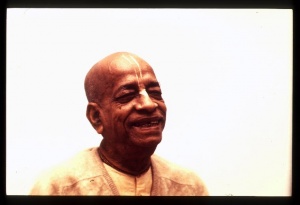SB 7.2.34

A.C. Bhaktivedanta Swami Prabhupada
TEXT 34
- tvayā kṛtajñena vayaṁ mahī-pate
- kathaṁ vinā syāma suhṛttamena te
- tatrānuyānaṁ tava vīra pādayoḥ
- śuśrūṣatīnāṁ diśa yatra yāsyasi
SYNONYMS
tvayā — you; kṛtajñena — a most grateful personality; vayam — we; mahī-pate — O King; katham — how; vinā — without; syāma — shall exist; suhṛt-tamena — the best of our friends; te — of you; tatra — there; anuyānam — the following; tava — of you; vīra — O hero; pādayoḥ — of the lotus feet; śuśrūṣatīnām — of those engaging in the service; diśa — please order; yatra — where; yāsyasi — you will go.
TRANSLATION
O King, O hero, you were a very grateful husband and the most sincere friend of all of us. How shall we exist without you? O hero, wherever you are going, please direct us there so that we may follow in your footsteps and engage again in your service. Let us go along with you!
PURPORT
Formerly, a kṣatriya king was generally the husband of many wives, and after the death of the king, especially in the battlefield, all the queens would agree to accept saha-māraṇa, dying with the husband who was their life. When Pāṇḍu Mahārāja, the father of the Pāṇḍavas, died, his two wives—namely, the mother of Yudhiṣṭhira, Bhīma and Arjuna and the mother of Nakula and Sahadeva—were both ready to die in the fire with their husband. Later, after a compromise was arranged, Kuntī stayed alive to care for the little children, and the other wife, Mādrī, was allowed to die with her husband. This system of saha-māraṇa continued in India even until the time of British rule, but later it was discouraged, since the attitude of wives gradually changed with the advancement of Kali-yuga. Thus the system of saha-māraṇa has practically been abolished. Nevertheless, within the past fifty years I have seen the wife of a medical practitioner voluntarily accept death immediately when her husband died. Both the husband and wife were taken in procession in the mourning cart. Such intense love of a chaste wife for her husband is a special case.